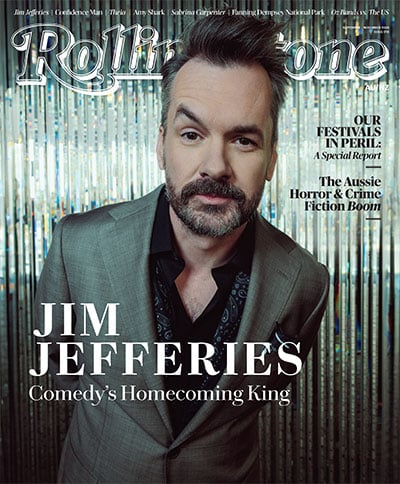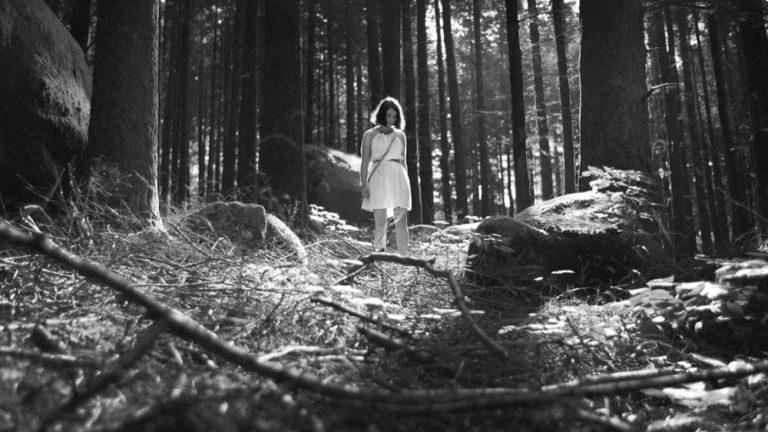The Forest Of Lost Souls is your typical guy-meets-girl story. Only, Carolina (Daniela Love), the girl, is a trendy, death-obsessed teenager and Ricardo (Jorge Mota), the guy, is a family man in his late ’50s. Oh, and the pair first cross paths in a forest, both moments away from committing suicide. And yeah, just to complicate things, one of them may or may not be a serial killer.
Evidently, The Forest Of Lost Souls is less conventional than your usual romantic drama fare. Like a version of Beyond Sunrise directed by Lucio Fulci, the film is both a taut, well-written character piece and a thrilling slasher film; a melancholy, black and white mediation on death, loss and the difficulty of letting go. Basically, it’s the kind of thing that could have been a tonally confused mess in the hands of a less talented filmmaker, but first time writer-director José Pedro Lopes handles the proceedings with dark humour and aplomb.
“The movie is full of farce, hypocrisy and social criticism,” Lopes explains. “Carolina’s character does have some qualities that are totally of our day and age: she is disconnected, she fakes interests, she uses cell phones to terrorize people and social [media] to create alibis. Balancing that with the film’s ‘angel of darkness’ narrative was complicated. The black and white cinematography and the very present and heavy soundtrack kept the tone of the film [consistent] even as it moved from horror to comedy, from drama to farce.”
Although The Forest is nothing if not grim, particularly in its second half, Lopes drew inspiration from a range of varied sources, and he worked hard to ensure that the film didn’t just come across as one note. “I took references from Andrei Tarkovsky’s use of bucolic landscapes and very wide shots. Also I really like modern day black and white films such as Frances Ha – that was [used] as reference for the relaxed look of Carolina and Ricardo’s friendship – and Miss Zombie, an excellent Japanese horror film from a couple of years ago. The cinematographer Francisco Lobo has worked with me in a lot of projects and we speak the same language, so he easily understood that the movie had to have a very lonely look to it.”
The movie is full of farce, hypocrisy and social criticism.
Certainly it’s true that as bloody as the film gets, The Forest is always grounded in the melancholy of its two central leads – in their failed hopes, wasted wants and impossible to achieve dreams. Even when the narrative takes a dramatic, blood-curdling turn at its almost exact midpoint, Lopes never loses sight of why we the audience should care about Carolina and Ricardo. Yet despite how accomplished and powerful the finished thing is, it almost got lost in the hustle and bustle of festival season, and could so easily have been just another brilliant lost gem; an underseen, under-recognized classic. “When we finished the film, we were aiming for a fall festival premiere. But the two festivals we were betting on turned down the film.
“At that point, I was thinking that maybe the film would go nowhere. Portugal has a very tiny market, especially for non-Hollywood films. And our film is a tough sell given it is low budget, arthouse, has no stars and isn’t very linear and easy to sum up. Then [Portuguese film festival] Fantasporto wanted to host its world premiere, and in less than a month or two we were being booked at festivals all around the world. So I guess that, unlike the sad message the film delivers through its story, I could say the experience [taught] me to stick to your work and keep pushing. ‘If you book them, they will come’, Jim Morrison said.”
Love Film & TV?
Get the latest Film & TV news, features, updates and giveaways straight to your inbox Learn more
The Forest Of Lost Souls screens at Event Cinemas George St on Monday June 12, and at Dendy Newtown on Saturday June 17 as part of Sydney Film Festival.

































